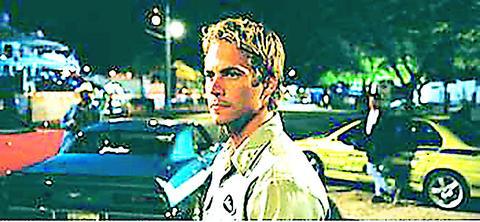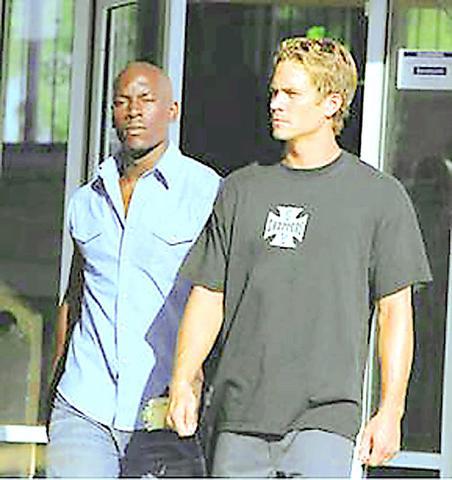2 Fast 2 Furious, a new seatbelt-awareness film that opens nationwide today, features two very fine and touching performances, both of them by cars.
Indeed, the movie, directed by John Singleton from a script by Michael Brandt and Derek Haas, can be seen as something of a love story, in which a pair of tricked-out Mitsubishis, a cute purple Spider convertible and a sinewy yellow Evolution carry out a high-speed courtship as they dart and frolic along the highways of South Florida.

PHOTO COURTESY OF UNIVERSAL
Then, at what should be their moment of consummation, these two frisky vehicles are replaced by a pair of domestic hotrods (an orange Dodge and a blue Chevy), one of which crashes onto the deck of a yacht.

PHOTO COURTESY OF UNIVERSAL
Unfortunately, all of these supremely expressive vehicles come equipped with drivers, principally a pair of crash-test dummies played by Paul Walker and Tyrese, whose low-gear dialogue makes the whine of engines sound like the highest poetry.
To make a dumb story short, the two of them, boyhood friends who have grown up to be an ex-cop (Mr. Walker) and an ex-con (Tyrese), go undercover to help a sexy customs agent (Eva Mendes) snare a drug kingpin (Cole Hauser).

PHOTO COURTESY OF UNIVERSAL
The kingpin is eager to hire street racers to ferry his ill-gotten gains from one place to another, perhaps because brightly painted flame-shooting cars traveling at double the speed limit are unlikely to attract the attention of law enforcement. He might have done better with Buick-driving retirees, or carrier pigeons, but that would have been a different movie.
This one is a sequel to The Fast and The Furious, the success of which helped propel Vin Diesel to stardom. Diesel and Rob Cohen, who directed the first movie, have moved on to the XXX franchise, leaving their successors choking on fumes.
2 Fast 2 Furious is among the most lethargic action movies I have ever seen: when Walker and Tyrese are not driving, it might as well be called 2 Slow 2 Tedious, since the script shows all the energy and sophistication of an old episode of TJ Hooker.
But even the racing and chasing, which is what really matters in a picture like this, is clumsy and lame, about as viscerally exciting as the masterworks of 8mm instructional cinema I was forced to watch in driver ed class back in high school.
The basic editing scheme suggests a how-to video on manual shifting techniques. Step one: depress the clutch. Step two: yank the gearshift. Step three: grimace and shout in the ethnic slang idiom of your choice. Repeat as necessary until you crash into something or find it advisable to activate the nitrogen-powered booster rockets, now available from your dealer as part of the special doofus hotrod sport package.
Singleton, whose limitations as an action director were also on display in the remake of Shaft,at least seems to respect the beauty of cars, and also, though respect may be precisely the wrong word, that of women.
Mendes and Devon Aoki have some lines to say, and Aoki is even permitted to drive. But mostly the women, like the cars, are around to fuel adolescent male fantasies and are similarly ogled, at leeringly low angles, by the camera, like a Pirelli calendar spread, all pose and no action.

June 2 to June 8 Taiwan’s woodcutters believe that if they see even one speck of red in their cooked rice, no matter how small, an accident is going to happen. Peng Chin-tian (彭錦田) swears that this has proven to be true at every stop during his decades-long career in the logging industry. Along with mining, timber harvesting was once considered the most dangerous profession in Taiwan. Not only were mishaps common during all stages of processing, it was difficult to transport the injured to get medical treatment. Many died during the arduous journey. Peng recounts some of his accidents in

“Why does Taiwan identity decline?”a group of researchers lead by University of Nevada political scientist Austin Wang (王宏恩) asked in a recent paper. After all, it is not difficult to explain the rise in Taiwanese identity after the early 1990s. But no model predicted its decline during the 2016-2018 period, they say. After testing various alternative explanations, Wang et al argue that the fall-off in Taiwanese identity during that period is related to voter hedging based on the performance of the Democratic Progressive Party (DPP). Since the DPP is perceived as the guardian of Taiwan identity, when it performs well,

A short walk beneath the dense Amazon canopy, the forest abruptly opens up. Fallen logs are rotting, the trees grow sparser and the temperature rises in places sunlight hits the ground. This is what 24 years of severe drought looks like in the world’s largest rainforest. But this patch of degraded forest, about the size of a soccer field, is a scientific experiment. Launched in 2000 by Brazilian and British scientists, Esecaflor — short for “Forest Drought Study Project” in Portuguese — set out to simulate a future in which the changing climate could deplete the Amazon of rainfall. It is

The Taiwan People’s Party (TPP) on May 18 held a rally in Taichung to mark the anniversary of President William Lai’s (賴清德) inauguration on May 20. The title of the rally could be loosely translated to “May 18 recall fraudulent goods” (518退貨ㄌㄨㄚˋ!). Unlike in English, where the terms are the same, “recall” (退貨) in this context refers to product recalls due to damaged, defective or fraudulent merchandise, not the political recalls (罷免) currently dominating the headlines. I attended the rally to determine if the impression was correct that the TPP under party Chairman Huang Kuo-Chang (黃國昌) had little of a